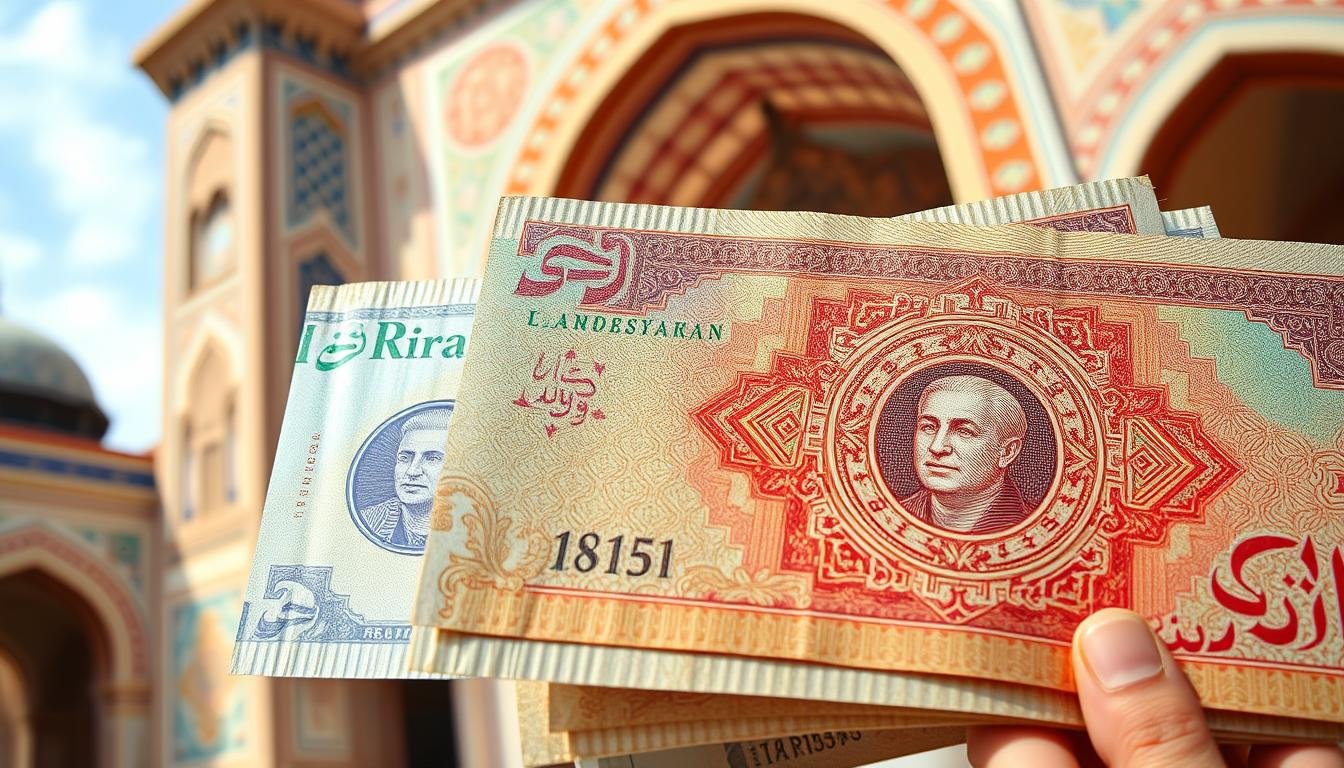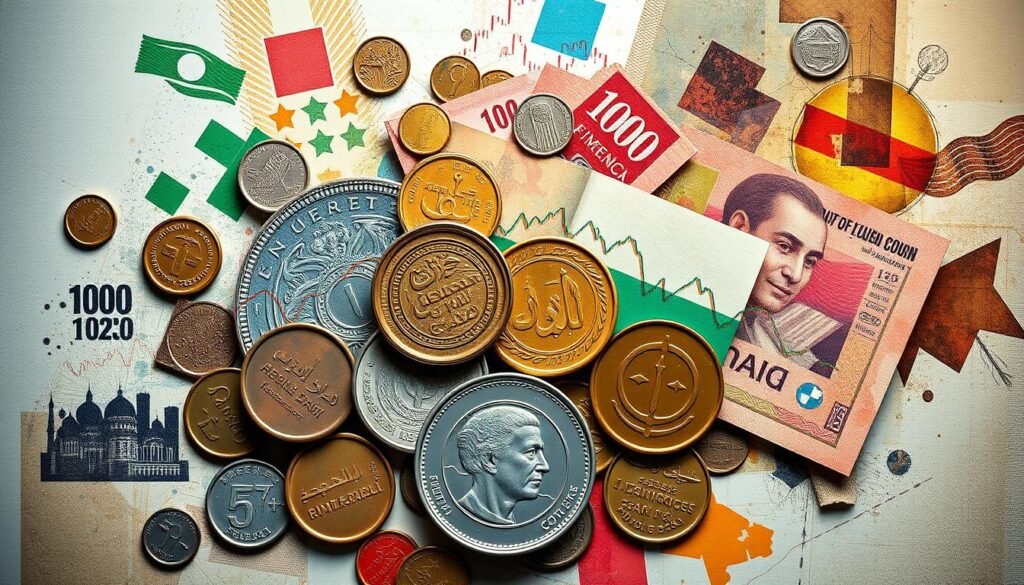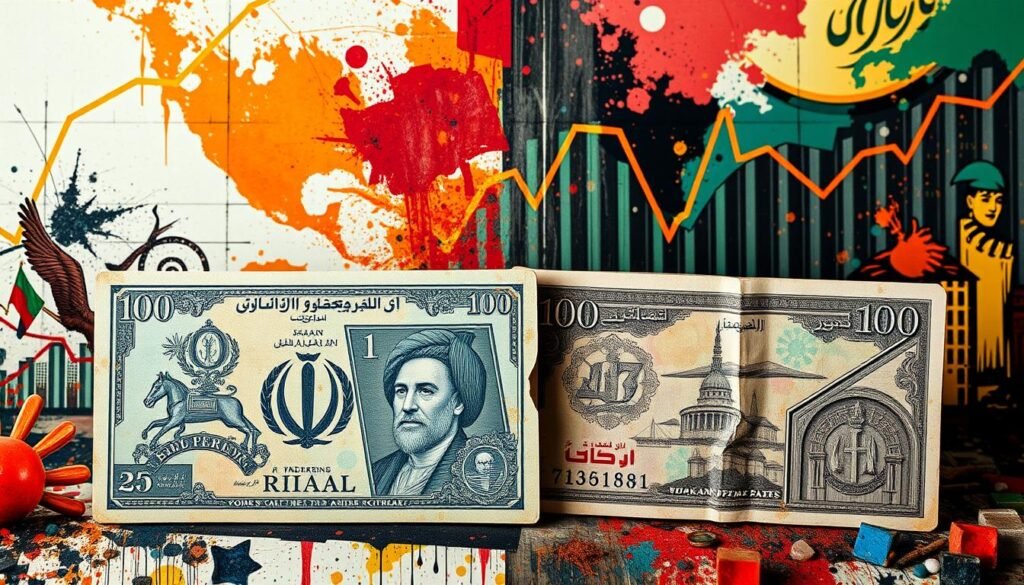
Planning a trip or business to Iran or Yemen? Knowing the local currency is key. Iran uses the Iranian Rial, facing challenges due to sanctions. The official rate is about 47,000 Rials for 1 USD1. But the black market rate is much higher, around 320,000 Rials for 1 USD1.
Yemen’s currency is the Yemeni rial, with a 16.8% inflation rate in 20232.
The Iranian Rial comes in many sizes, from 1000 to 1 million1. Yemen’s rial is split into 100 fils2. Knowing these details helps you understand the exchange rates. The Yemeni Rial’s value can change a lot because of political issues2.
Key Takeaways
- Understanding the local currency is key for travel or business in Iran or Yemen.
- The Iranian Rial has an official exchange rate of around 47,000 Rials to 1 USD1.
- The Yemeni Rial has an inflation rate of 16.8% in 20232.
- The Iranian Rial comes in various denominations, including 1000, 2000, and 50001.
- The Yemeni Rial is divided into 100 fils, with banknotes ranging from 1 to 1,000 rials2.
- Exchange rates for both currencies can fluctuate significantly due to economic and political factors12.
What Are the Currencies of Iran and Yemen?
The official currency of Iran is the Iranian Rial, and Yemen’s is the Yemeni Rial. It’s key to know the exchange rates and economic factors that impact their value. The yemen currency market is shaped by international sanctions and trade ties.
1 Yemeni Rial equals 168.5 Iranian Rial3. Yemeni Rial comes in 50, 100, 200, 500, and 1000 denominations. Iranian Rial is available in 1000, 2000, 5000, 10,000, 20,000, 50,000, 100,000, 500,000, and 1 million denominations. Yemen’s economy has seen inflation rise, with a 37.5% contraction estimated by the World Bank from 20154.
Here is a brief overview of the Yemeni Rial exchange rates with other currencies:
| Currency | Exchange Rate |
|---|---|
| US Dollar | 0.004 |
| British Pound | 0.003 |
| Indian Rupee | 0.343 |
The yemeni rial faces economic challenges, including a GDP (PPP) of $69.963 billion and a Gini coefficient of 36.7. This shows medium inequality5. Knowing these factors is vital when handling iran money and yemen currency.
Historical Background of Iran’s Currency
The iran currency exchange rate has seen big changes over time. These changes were due to economic and political issues. The Iranian Rial, started in 1932, has had ups and downs in value because of sanctions and other economic problems6.
For example, the rial’s value dropped by 450 percent from 2018 to 2020. It went from 42,880 rials to 318,560 rials per USD6.
Knowing about the iranian currency and its past is key to understanding the iran currency exchange rate. Iran’s economy has faced big challenges, like a shortage of hard currency and a drop in the rial’s value. These issues are due to political tensions and a lack of export money6.
Also, Iran’s population is about 87,529,000 in 2024, with a total area of 1,630,848 square kilometers7.
The iran currency exchange rate is also affected by the country’s economic signs, like GNI and GNI per capita. In 2023, the GNI was around 417,389,000,000 USD, with a GNI per capita of 4,680 USD7.
The iranian currency has lost a lot of value over the years. It went from seventy rials to the dollar in 1979 to 165,000 rials today8. This imbalance has caused financial problems for exporters, leading to bankruptcies and more unemployment8.
| Year | Iranian Rial to USD |
|---|---|
| 2018 | 42,880 |
| 2020 | 318,560 |
| 2024 | 41932.958 |
In conclusion, the iranian currency and iran currency exchange rate are complex. They are influenced by many economic and political factors. Understanding these factors is key to navigating the Iranian economy678.
The Evolution of Yemen’s Currency System
Yemen’s currency system has seen big changes, mainly after North and South Yemen united in 1990. The Yemeni Riyal became the official currency, deeply affecting the economy. To grasp the current yemen money situation, we must look at the past and the changes after unification.
Before unification, North Yemen and South Yemen had their own currencies. After joining, the Yemeni Riyal was introduced, tied to the US dollar. But, the yemen currency exchange rate has changed a lot due to war and sanctions9.
The war has hit Yemen’s economy hard. The GDP dropped by 50%, and unemployment rose to almost 60%9. The Yemeni Riyal’s value against the US dollar has also been unstable, with big differences in Sana’a and Aden9.
In summary, knowing how Yemen’s currency system evolved is key to understanding yemen money and the yemen currency exchange rate. By looking at the past and the changes after unification, we see the challenges Yemen faces in keeping its currency stable10.
Current Exchange Rates and Value Fluctuations

The Iranian Rial and Yemeni Rial have seen big changes in value. This is due to economic and political reasons11. Knowing the current exchange rates is key for those trading or investing internationally. The rate between the two is about 1 YER = 167.72488649115 IRR11, but it can change.
Inflation has hit the Iranian Rial hard, making it less valuable11. The Yemeni Rial has also lost value, with a big drop in its worth11. For example, 1 YER = 32 IRR shows how rates can shift11.
Statistical data shows big swings in exchange rates for both currencies. The highest rate was 685.02, and the lowest was 0.1712. The average rate is about 305.61, with a big fluctuation of 135.7% and a small one of -12.9%12.
It’s important to get the latest exchange rate for accurate conversions. Rates can change a lot due to Yemen and Iran’s economic situations11. Here’s a table showing exchange rates for different Yemeni Rial amounts:
| Yemeni Rial (YER) | Iranian Rial (IRR) |
|---|---|
| 1 YER | 167.72488649115 IRR |
| 10 YER | 1677.2488649115 IRR |
| 100 YER | 16772.488649115 IRR |
The Iranian Rial and Yemeni Rial face many economic challenges. These include inflation, foreign exchange rates, and global events11. Knowing these factors helps in making smart currency exchange and investment choices.
How to Identify Authentic Iranian Bank Notes
When handling iran currency, it’s key to check if the bank notes are real. This is true for both travelers and businesses. The iranian rial is Iran’s official money. Spotting real iranian rial bank notes can be tricky. Look out for security features like watermarks, holograms, and microprinting to avoid fake notes13.
To spot real iranian rial bank notes, check for these features:
- Watermarks: A watermark is a clear image in the paper, visible when lit up.
- Holograms: A hologram is a 3D image that shines and looks different from all sides.
- Microprinting: This is tiny text or images that are hard to copy.
Also, know that common Iranian banknotes are 10,000, 20,000, 50,000, 100,000, 500,000, and 1,000,000 Rials. These are often used for buying things14.
Checking the security features is just the start. Also, look at the iranian rial exchange rates and value changes. This helps make sure you’re getting a good deal. The Financial Crimes Enforcement Network (FinCEN) has a warning for U.S. banks. It’s about spotting suspicious Iran-related money moves15.
| Currency | Security Features |
|---|---|
| Iranian Rial | Watermarks, holograms, microprinting |
Understanding Yemen’s Currency Denominations
The yemeni rial is Yemen’s currency, coming in 50, 100, 200, 500, and 1000 denominations16. Each type has special security features. It’s key for travelers and businesses to know about these, as the currency has changed due to conflict.
Old Yemeni rial banknotes, from before 2016, are now worth about 10% more than the newer ones17. This has made the value of the yemeni rial drop. In government-controlled areas, it’s worth around 1,000 to the U.S. dollar18. But in Houthi-controlled zones, it stays stable at about 600 to the U.S. dollar18.
Here are some key facts about the yemen currency:
- The Yemeni rial is the official legal tender in Yemen16.
- Around 180 currencies worldwide are traded against the Yemeni rial16.
- Exchange rates change over time due to economic, political, and market factors16.
Knowing the different yemeni rial denominations and security features is vital for business or travel in Yemen. The conflict has impacted the currency, causing a dual-currency system. This has brought challenges, like double prices and trade difficulties1718.
Economic Factors Affecting Both Currencies
The value of iran money and yemen money changes due to many economic factors. In Iran, high inflation rates have hurt the Rial’s value19. The country aimed for 8% economic growth but faced over 40% inflation for four years19.
In Yemen, the economy struggles due to ongoing conflict. This has impacted the value of yemen money. Iran, on the other hand, sees its current account balance stay in surplus thanks to oil prices and exports19. The Iranian Rial’s value against the US dollar has dropped by over 55 percent in a year20.
Here are some key economic factors affecting both currencies:
- Inflation rates: Iran’s inflation rate has been in double digits for several years20.
- Trade balances: Iran’s trade balance is expected to remain in surplus19.
- Fiscal pressures: Yemen’s fiscal pressures have increased due to the ongoing conflict.
The economic factors impacting iran money and yemen money are complex. It’s important to understand these factors for smart currency exchange and investment decisions1920.
| Country | Inflation Rate | Trade Balance |
|---|---|---|
| Iran | 40% | Surplus |
| Yemen | Not available | Deficit |
Practical Tips for Currency Exchange
Traveling to Iran means understanding the local currency exchange rate. This helps you get the most value for your money. The iran currency exchange market has two rates: the Government Official Rate and the Market Rate21. For better conversion, use the market rate over the government rate22.
To exchange money safely, find authorized dealers. Look for them in major cities like Tehran, Shiraz, Isfahan, and Yazd21. These places show real-time rates on electronic boards. This ensures you get a fair deal. Also, consider online platforms like Mah Card for foreign tourists visiting Iran21.
Here are some safety tips to remember:
- Deal only with reputable exchange services22.
- Carry only needed cash amounts22.
- Avoid carrying large sums of cash22.
- Be cautious of possible theft22.
By following these tips, you can have a smooth and secure currency exchange in Iran. You’ll get the best value for your money at the current rate21.
| Currency | Exchange Rate |
|---|---|
| US Dollar | 1 USD = 120,000 IRR (approx.)21 |
| Euro | 1 EUR = 130,000 IRR (approx.)22 |
Digital Payment Systems and Alternatives
Digital payment systems are key for iran money and yemen money. By October 2023, 130 countries, making up 98% of global GDP, were looking into Central Bank Digital Currencies (CBDCs)23. The Middle East and Central Asia are also on board, with 19 countries checking out CBDCs23.
In Iran, digital payments face hurdles due to sanctions. Yet, the country is exploring online banking and mobile payments24. Yemen is also working on mobile payments and other digital options, despite challenges24.
The perks of digital payments include:
- More people can access money
- It’s safer
- It cuts down on costs
But, there are hurdles like needing better infrastructure and facing cyber threats25.
In summary, digital payments are vital for iran money and yemen money. Countries are looking into CBDCs and digital systems to boost financial access and lower costs23.
| Country | Digital Payment System |
|---|---|
| Iran | Online banking, mobile payments |
| Yemen | Mobile payments, online banking |
Future Outlook for Both Monetary Systems

The future of the Iranian Rial and Yemeni Rial is uncertain. The Iranian government is considering reforms, like introducing a new currency or changing the current one26. These changes could affect the currency exchange rate and the economy.
In Yemen, the economy is facing big challenges. The Yemeni Rial’s value has been unstable due to the ongoing conflict27. The future of the Yemeni Rial depends on ending the conflict and stabilizing the economy.
Some possible reforms for the Iranian Rial and Yemeni Rial include:
- Introduction of a new currency or redenomination of the existing one
- Changes to the currency exchange rate
- Implementation of economic reforms to stabilize the economy
International events can also impact these currencies. For instance, global economic shifts or sanctions could affect the Iranian Rial and Yemeni Rial26. It’s important to watch these events and their possible effects.
Conclusion
Understanding the currencies of Iran and Yemen is key for anyone doing business or traveling there. The28 political and economic situation has greatly affected the Iranian Rial and Yemeni Riyal. This shows how important it is to be careful and make smart choices.
We’ve looked at the history, current rates, and future of these currencies. The Rial has shown strength despite sanctions28. The Riyal faces big challenges due to Yemen’s ongoing conflict28. This gives us a full picture of what’s happening with these currencies.
It’s vital to keep up with changes in the29 world and how they affect Iran and Yemen’s economies. By staying informed, you can make better choices about money, trade, and investments in these areas.
The currencies of Iran and Yemen are a great example of how politics, economics, and global events are connected2829. Knowing about these currencies helps you deal with the region’s challenges. It also helps in working towards stability and growth in this exciting part of the world.
FAQ
What are the currencies of Iran and Yemen?
What is the history and background of the Iranian Rial?
How has Yemen’s currency system evolved over time?
What are the current exchange rates for the Iranian Rial and Yemeni Riyal?
How can I identify authentic Iranian bank notes?
What are the denominations and security features of Yemeni currency?
What are the economic factors that affect the value of the Iranian Rial and Yemeni Riyal?
Where can I safely exchange money in Iran and Yemen?
What digital payment options are available in Iran and Yemen?
What is the future outlook for the Iranian Rial and Yemeni Riyal?
Source Links
- Money – https://www.saigatours.com/details/middle-east/iran/money/
- Yemeni rial – https://en.wikipedia.org/wiki/Yemeni_rial
- Convert Yemen Riyal to Iran Rial – https://www.currency.me.uk/convert/yer/irr
- Is Iran Trying to Inflate Yemen’s Currency as a Tool of Warfare? – https://www.lawfaremedia.org/article/iran-trying-inflate-yemens-currency-tool-warfare
- Yemen – https://en.wikipedia.org/wiki/Yemen
- The Geopolitical Roots of Iran’s Economic Crisis – https://carnegieendowment.org/sada/2020/12/the-geopolitical-roots-of-irans-economic-crisis?lang=en
- Iran | People, Religion, Leader, President, Map, & Nuclear Deal | Britannica – https://www.britannica.com/place/Iran
- Iran’s economy and the burden of multiple exchange rates – https://www.atlanticcouncil.org/blogs/iransource/irans-economy-and-the-burden-of-multiple-exchange-rates/
- Unification of Monetary Policy and the Banking Sector in Yemen – https://mecouncil.org/blog_posts/unification-of-monetary-policy-and-the-banking-sector-in-yemen/
- Overview – https://www.worldbank.org/en/country/yemen/overview
- YER to IRR convert – Yemen Riyal to Iran Rial Exchange Rate – https://mathda.com/convert/currency/yer-to-irr?sourceValue=1
- World Development Indicators | The World Bank – https://wdi.worldbank.org/table/4.16
- Treasury Designates Large-Scale IRGC-QF Counterfeiting Ring – https://home.treasury.gov/news/press-releases/sm0219
- IRANIAN CURRENCY & EXCHANGING MONEY IN IRAN – https://toursofiran.com/blog/iranian-currency/
- FinCEN Advisory FIN-2018-A006, October 11, 2018 – https://www.fincen.gov/sites/default/files/advisory/2018-10-12/Iran Advisory FINAL 508.pdf
- All About the Yemeni Rial in 2025 – https://www.monito.com/en/what-is-the-currency-in/yemen
- One country, two monetary systems – http://jpkoning.blogspot.com/2020/05/one-country-two-monetary-systems.html
- Yemen currency clash deepens crisis in war-torn country – https://www.aljazeera.com/news/2021/8/22/yemen-currency-clash-deepens-crisis-in-war-torn-country
- Overview – https://www.worldbank.org/en/country/iran/overview
- There’s a Forex market crisis in Iran. The root cause of its problems is the clerical establishment. – https://www.atlanticcouncil.org/blogs/iransource/theres-a-forex-market-crisis-in-iran-the-root-cause-of-its-problems-is-the-clerical-establishment/
- Exchanging Dollars/Euros to Iranian Rials – Iran Travel Tips – https://www.tappersia.com/exchanging-money-in-iran/
- Comprehensive Guide: Exchanging Money in Iran – https://livingintehran.com/2023/06/21/guide-exchange-money-iran/
- No title found – https://www.elibrary.imf.org/view/journals/087/2024/004/article-A001-en.xml
- Russia and Iran launch payment system as an alternative to Swift – https://www.middleeasteye.net/news/russia-and-iran-launch-payment-system-alternative-swift
- No title found – https://www.elibrary.imf.org/view/journals/063/2024/001/article-A001-en.xml
- Iran’s Role in the Yemen War: Real Influence and Regional Gains – https://mecouncil.org/publication_chapters/irans-role-in-the-yemen-war-real-influence-and-regional-gains/
- BTI 2024 Yemen Country Report – https://bti-project.org/en/reports/country-report/YEM
- World Report 2022: Rights Trends in Yemen – https://www.hrw.org/world-report/2022/country-chapters/yemen
- American Lion, Near East Hyenas: US Options In Yemen And Iran – https://www.hoover.org/research/american-lion-near-east-hyenas-us-options-yemen-and-iran







Interesting read! But, isnt it a bit strange that despite the economic struggles, both Iran and Yemen have managed to maintain their own unique currency systems? Thoughts?
Interesting read! However, dont you think its crucial to delve deeper into the impact of economic sanctions on the value of Irans and Yemens currencies? Surely, thats a key factor in their current state.
Interesting read, but isnt it curious how the currency value affects the common man more than the government officials?
Interesting read! But isnt there a correlation between the political climate and the value of Iran and Yemens currencies?